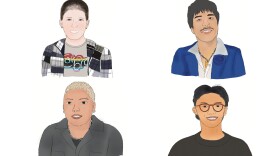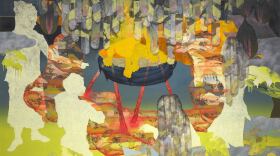Hip hop and jazz have a long shared history. In the 1990's artists like A Tribe Called Quest and Digable Planets were introducing younger listeners to jazz musicians like Grant Green and Bobbi Humphrey by sampling their work and drawing inspiration from their musical arrangements.
On his new record "Cream," the Seattle-based jazz drummer and producer Kassa Overall explores that relationship in a different way. His last record "Animals" could be described as a jazzy hip hop record, but on "Cream" he flips that formula by creating jazz arrangements of hip hop classics. It's an experimental piece of work that keeps the listener engaged with its exploratory playfulness around familiar hooks. He turns the Dr. Dre classic "Nuthin' but a "G" Thang" into a meditative piece of spiritual music.
Besides releasing the new record, Overall was also awarded a Doris Duke Artist award this year. It's an award that celebrates "innovative and risk-taking artists" from the world of jazz, dance, and theatre.
Overall will be performing the new record at Missy Lane's Assembly Room on September 17 and 18. He recently caught up with WUNC music reporter Brian Burns to talk about the new record and what people can expect when they come out to the show.
Tell us about the concept behind the new record.
I call this one a response record to all my other records. For those that don't know my past work, I usually go into the studio and spontaneously compose and sketch stuff out, then I chop that up for months or sometimes years and write lyrics when the time feels right. For this one, we flip that inside out. I picked a bunch of rap songs from the golden era of hip hop, and I took the compositional material and arranged it in more of a spiritual jazz setting. We went in the studio and recorded those in a similar way to Miles Davis' "Kind of Blue" or Coltrane's "A Love Supreme."
What do you think are some of the similarities between jazz and hip hop?
I think the most important thing to spot is that they're both a cultural expression of a people. Jazz and hip hop are all Black American cultural expressions. They both obviously contain many other cultural influences, but at their core they're both expressions of Black Americans.
I also think that jazz and hip hop are both expressions of under voiced people. Hip hop really, on a spiritual level, caught on as an expression for people who didn't have access to instruments or access to the normal music industry complex. That obviously changed over time, but at its beginning it was like cooking with what you already had in the kitchen. It was a musical soul food. I think jazz was similar that way, too, just for a different generation.
Was it hard to narrow down the tracks you were going to include on this record?
It was hard in a very relaxed and fun way. I was listening to all these playlists of classic hip hop and asking myself "Can I do this one?" It was fun, but there were definitely a few I sketched out that didn't end up working.
The first track you released from the record is your flip of the Digable Planets classic "Rebirth of Slick (Cool Like Dat)." Tell us about your history with that song.
Digable Planets were the first group to mix jazz and hip hop that worked for me. It's always a little dangerous when people do that because it can sometimes come off as corny. They were the opposite of corny. When they did it it was just cool and smooth. They were real jazz heads.
I eventually got to know them and played with them and also opened for them on that same tour. It was amazing, but it was also a challenge to play two sets a night and then sell merch and then pack up the van and drive to another city to do it again. After that tour I knew if I could do that I could do a lot.
You've also got a version of the Wu-Tang Clan classic "C.R.E.A.M." on this record. When did that song come into your life?
When that record came out I was in seventh grade and playing football. I didn't know what the lyrics were, but I remember everyone around me humming that melody. I always loved New York and wanted to move there to play with great jazz musicians, and I think that Wu Tang record made me feel like I was there. They also had more of a spiritual expression than a lot of other hip hop at that time. I gravitated towards that too as someone who came up with parents into Rasta culture and Buddhism.
What can people expect when they come out to the shows at Missy Lane's this week?
This will be the first time we play the album. We're going to play it from top to bottom, but we're improvisers so that means it probably won't exactly sound like the album. We might open up some parts and rearrange some other parts. After that we'll also get into some of the older material, but that'll be different too because we're really focused on the style that this new record brings.







